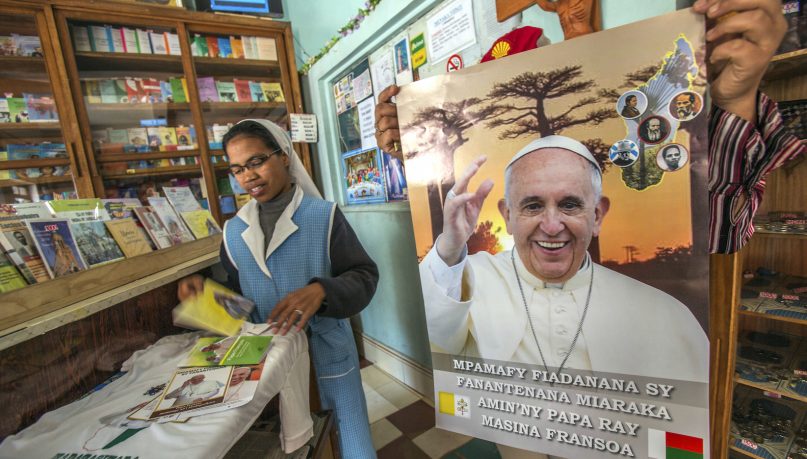VATICAN CITY (RNS) — Pope Francis begins a weeklong trip to Africa on Wednesday (Sept. 4), with stops in Mozambique, Madagascar and Mauritius and a jampacked schedule that includes 15 speeches in Portuguese and Italian.
A pope has not visited the three African nations since St. Pope John Paul II went to the region when the relatively young countries were still beginning on a path of democracy and development in the wake of colonial rule, while navigating the competing influences of the major powers in the Cold War.
Though Mozambique is still grappling with the transition to independence, all three countries’ challenges have become in many ways the globe’s, and Francis plans to pull each into his vision of how to address them.
“The main themes of this visit are fundamentally three,” said Italian Cardinal Pietro Parolin, the Vatican’s secretary of state, in an Aug. 30 interview with Vatican News. “The first is insisting on the theme of peace, then definitely on the theme of the care of creation, in line with ‘Laudato Si’,’ then the culture of encounter.”
Parolin described Africa as “a laboratory for integral development,” a term that in this papacy refers to a welcoming and sustainable society based on the precepts laid out in the pope’s 2015 encyclical on the environment, “Laudato Si’.”
In Mozambique, the first official stop of the trip, the government recently signed a fragile peace treaty with its longtime rebel opposition, ahead of next month’s presidential elections. The country is also still recovering from this summer’s devastating cyclones.
The treaty is the third agreement to halt the violence lingering from the colony’s 15-year-long civil war that followed independence from Portugal in 1975. During his 1988 visit, John Paul II vehemently urged the two sides to reconcile, which later lead leaders of the ruling Socialist Liberation Front and the Renamo guerrilla forces to Rome to negotiate the first accord, in 1992.
Much of the groundwork for that treaty was laid by Andrea Riccardi, founder of the Community of St. Egidio, an international association of lay Catholics dedicated to conflict resolution that today is a favorite of Francis. Riccardi’s partner was Matteo Zuppi, an Italian priest whom Francis named archbishop of Bologna, Italy, in 2015.
Francis has shown his appreciation for Zuppi’s work by announcing that he will be made a cardinal at the next consistory on Oct. 5.
Francis will meet with Mozambique President Filipe Nyusi, local authorities and a diverse group of young people to underline the importance of dialogue in general, especially in light of this situation in the country, Parolin said.
On Friday, the pope will pay homage to the work of the Community of St. Egidio by visiting a center for people affected by AIDS that the movement created in Zimpeto, a neighborhood in the outskirts of the country’s capital, Maputo.
Francis will also visit Madagascar on Friday, spreading a message of sustainability and encounter in an island nation known for the diversity of its habitat as well as its abject poverty and massive deforestation.
Some studies suggest that up to 40% of the country’s forests have been lost since the 1950s, and the burning of forests to benefit cattle and agriculture continues to be a common practice.
The pope will meet with local clergy and pray on the tomb of Blessed Victoire Rasoamanarivo, who cared for lepers on the island and was beatified by John Paul II during his visit to Madagascar in 1989. On Sunday, Francis will visit Akamasoa, “the city of friendship,” founded by the Rev. Pedro Opeka, an Argentine missionary, on what used to be a landfill.
Madagascar is a “young country that finds itself facing many challenges,” Parolin said, adding that Pope Francis will take the opportunity to speak to the young people there and to address the growing divide between the poor and the wealthy.
“I think that the pope’s visit will empower efforts to offer everyone, but especially the many young people, an opportunity for development and a future,” he said.
Francis’ last stop will be in Mauritius, another island nation located in the Indian Ocean often riven by its faiths. The country’s population is nearly half Hindu, with Catholics and Muslims making up the rest.
“The encounter between differences will become particularly relevant,” Parolin said, “by overcoming every type of discrimination: For example, the question of accepting openness toward immigrants who often come from other places to seek a better quality of life.”
Francis will return to the Vatican on Sept. 10.





